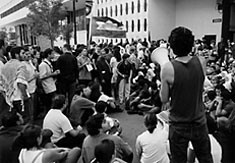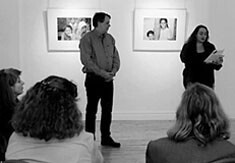The Electronic Intifada 30 April 2003
Speaking about the U.S. civil rights movement, American linguist and political analyst Noam Chomsky once said: “… Martin Luther King was certainly important, but he was not the civil rights movement. Martin Luther King can appear in the history books because lots of people whose names you will never know, and whose names are all forgotten were working down in the South.”
The following photo essay is about some of the people “whose names you will never know,” but whose work is essential to the success of the Palestinian struggle.
For one year, I attended a large number of the many events organized by Palestinian solidarity groups in Montreal, Canada. The movement in Montreal is impressive and broad-based, including numerous university student organizations, Jewish-Palestinian alliances, Canadian Arab organizations, women’s groups, medical organizations, unions, and other highly committed non-governmental organizations.

While the scope of political goals is wide, one constant theme emerges from the work of the solidarity groups: putting an end to the repressive Israeli military occupation.
On a personal note, I spent the month of November 2002 in the West Bank and Gaza where I had the chance to observe first-hand both the living conditions of the Palestinians and the violent repression that surrounds them.
During my stay, more than 20 Palestinians were killed and over 90 injured in 45 different IDF operations. In Rafah, I lived with families faced with house demolition whose daily life was punctured by frightening gun battles and indiscriminate lethal IDF attacks.
In Jenin, I traveled to outlying regions, witnessing first-hand the destructive impact of checkpoints and curfews.
Studying and witnessing one of modern history’s longest running and most violent military occupations has a sobering effect. It is clear that the Palestinian people alone will not end the Israeli occupation. The cards are too cruelly stacked against them. Israeli is too well armed and too heavily supported by the U.S. Other governments are muted in their criticism and hesitant to take action to help turn the tide.

However, when one encounters Palestinian determination in the Occupied Territories, or taps into the international solidarity movement or discovers the rich sources of news and research available on the occupation, one feels hope for the future.
The following photo essay is intended as a message of hope and as an opportunity to increase the number of international connections that will bring an end to the Israeli occupation.

Click here to read the photo story



